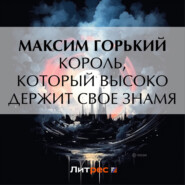По всем вопросам обращайтесь на: info@litportal.ru
(©) 2003-2024.
✖
The Man Who Was Afraid
Настройки чтения
Размер шрифта
Высота строк
Поля
“Because you cannot tolerate it when your father grumbles at you. You’re ready to quarrel immediately.”
“But it is offensive. I have not grown worse than I was before. Don’t I see how others live at my age?”
“Your head wouldn’t fall off from my scolding you. And I scold you because I see there is something in you that is not mine. What it is, I do not know, but I see it is there. And that something is harmful to you.”
These words of Ignat made the son very thoughtful. Foma also felt something strange in himself, something which distinguished him from the youth of his age, but he, too, could not understand what it was. And he looked at himself with suspicion.
Foma liked to be on the Exchange amid the bustle and talk of the sedate people who were making deals amounting to thousands of roubles; the respect with which the less well-to-do tradesmen greeted and spoke to him – to Foma, the son of the millionaire – flattered him greatly. He felt happy and proud whenever he successfully managed some part of his father’s business, assuming all responsibility on his own shoulders, and received a smile of approval from his father for it. There was in him a great deal of ambition, yearning to appear as a grown-up man of business, but – just as before his trip to Perm – he lived as in solitude; he still felt no longing for friends, although he now came in contact everyday with the merchants’ sons of his age. They had invited him more than once to join them in their sprees, but he rather rudely and disdainfully declined their invitations and even laughed at them.
“I am afraid. Your fathers may learn of your sprees, and as they’ll give you a drubbing, I might also come in for a share.”
What he did not like in them was that they were leading a dissipated and depraved life, without their fathers’ knowledge, and that the money they were spending was either stolen from their parents or borrowed on long-termed promissory notes, to be paid with exorbitant interest. They in turn did not like him for this very reserve and aversion, which contained the pride so offensive to them. He was timid about speaking to people older than himself, fearing lest he should appear in their eyes stupid and thick-headed.
He often recalled Pelageya, and at first he felt melancholy whenever her image flashed before his imagination. But time went on, and little by little rubbed off the bright colours of this woman; and before he was aware of it his thoughts were occupied by the slender, angel-like Medinskaya. She used to come up to Ignat almost every Sunday with various requests, all of which generally had but one aim – to hasten the building of the lodging-asylum. In her presence Foma felt awkward, huge, heavy; this pained him, and he blushed deeply under the endearing look of Sophya Pavlovna’s large eyes. He noticed that every time she looked at him, her eyes would grow darker, while her upper lip would tremble and raise itself slightly, thus displaying very small white teeth. This always frightened him. When his father noticed how steadfastly he was staring at Medinskaya he told him one day:
“Don’t be staring so much at that face. Look out, she is like a birch ember: from the outside it is just as modest, smooth and dark – altogether cold to all appearances – but take it into your hand and it will burn you.”
Medinskaya did not kindle in the youth any sensual passion, for there was nothing in her that resembled Pelageya, and altogether she was not at all like other women. He knew that shameful rumours about her were in the air, but he did not believe any of them. But his relations to her were changed when he noticed her one day in a carriage beside a stout man in a gray hat and with long hair falling over his shoulders. His face was like a bladder – red and bloated; he had neither moustache nor beard, and altogether he looked like a woman in disguise. Foma was told that this was her husband. Then dark and contradicting feelings sprang up within him: he felt like insulting the architect, and at the same time he envied and respected him. Medinskaya now seemed to him less beautiful and more accessible; he began to feel sorry for her, and yet he thought malignantly:
“She must surely feel disgusted when he kisses her.”
And after all this he sometimes perceived in himself some bottomless and oppressive emptiness, which could not be filled up by anything – neither by the impressions of the day just gone by nor by the recollection of the past; and the Exchange, and his affairs, and his thoughts of Medinskaya – all were swallowed up by this emptiness. It alarmed him: in the dark depth of this emptiness he suspected some hidden existence of a hostile power, as yet formless but already carefully and persistently striving to become incarnate.
In the meantime Ignat, changing but little outwardly, was growing ever more restless and querulous and was complaining more often of being ill.
“I lost my sleep. It used to be so sound that even though you had torn off my skin, I would not have felt it. While now I toss about from side to side, and I fall asleep only toward morning. And every now and then I awaken. My heart beats unevenly, now, though tired out; often thus: tuk-tuk-tuk. And sometimes it sinks of a sudden – and it seems as though it would soon tear itself away and fall somewhere into the deep; into the bosom. Oh Lord, have pity upon me through Thy great mercy.” And heaving a penitent sigh, he would lift heavenward his stern eyes, grown dim now, devoid of their bright, sparkling glitter.
“Death keeps an eye on me somewhere close by,” he said one day morosely, but humbly. And indeed, it soon felled his big, sturdy body to the ground.
This happened in August, early in the morning. Foma was sound asleep when suddenly he felt somebody shaking him by the shoulder, and a hoarse voice called at his ear:
“Get up.”
He opened his eyes and saw that his father was seated in a chair near his bed, monotonously repeating in a dull voice:
“Get up, get up.”
The sun had just risen, and its light, falling on Ignat’s white linen shirt, had not yet lost its rosy tints.
“It’s early,” said Foma, stretching himself.
“Well, you’ll sleep enough later.”
Lazily muffling himself in the blanket, Foma asked:
“Why do you need me?”
“Get up, dear, will you, please?” exclaimed Ignat, adding, somewhat offended: “It must be necessary, since I am waking you.”
When Foma looked closely at his father’s face, he noticed that it was gray and weary.
“Are you ill?”
“Slightly.”
“Shall we send for a doctor?”
“The devil take him!” Ignat waved his hand. “I am not a young man any longer. I know it as well without him.”
“What?”
“Oh, I know it!” said the old man, mysteriously, casting a strange glance around the room. Foma was dressing himself, and his father, with lowered head, spoke slowly:
“I am afraid to breathe. Something tells me that if I should now heave a deep sigh, my heart would burst. Today is Sunday! After the morning mass is over, send for the priest.”
“What are you talking about, papa?” Foma smiled.
“Nothing. Wash yourself and go into the garden. I ordered the samovar to be brought there. We’ll drink our tea in the morning coolness. I feel like drinking now hot, strong tea. Be quicker.”
The old man rose with difficulty from the chair, and, bent and barefooted, left the room in a staggering gait. Foma looked at his father, and a shooting chill of fear made his heart shrink. He washed himself in haste, and hurried out into the garden.
There, under an old, spreading apple-tree sat Ignat in a big oaken armchair. The light of the sun fell in thin stripes through the branches of the trees upon the white figure of the old man clad in his night-garments. There was such a profound silence in the garden that even the rustle of a branch, accidentally touched by Foma’s clothes, seemed to him like a loud sound and he shuddered. On the table, before his father, stood the samovar, purring like a well-fed tom-cat and exhaling a stream of steam into the air. Amid the silence and the fresh verdure of the garden, which had been washed by abundant rains the day before, this bright spot of the boldly shining, loud brass seemed to Foma as something unnecessary, as something which suited neither the time nor the place – nor the feeling that sprang up within him at the sight of the sickly, bent old man, who was dressed in white, and who sat alone underneath the mute, motionless, dark-green foliage, wherein red apples were modestly peeping.
“Be seated,” said Ignat.
“We ought to send for a doctor.” Foma advised him irresolutely, seating himself opposite him.
“It isn’t necessary. It’s a little better now in the open air. And now I’ll sip some tea and perhaps that will do me more good,” said Ignat, pouring out tea into the glasses, and Foma noticed that the teapot was trembling in his father’s hand.
“Drink.”
Silently moving up one glass for himself, Foma bent over it, blowing the foam off the surface of the tea, and with pain in his heart, hearing the loud, heavy breathing of his father. Suddenly something struck against the table with such force that the dishes began to rattle.
Foma shuddered, threw up his head and met the frightened, almost senseless look of his father’s eyes. Ignat stared at his son and whispered hoarsely:
“An apple fell down (the devil take it!). It sounded like the firing of a gun.”
“Won’t you have some cognac in your tea?” Foma suggested.
“It is good enough without it.”
They became silent. A flight of finches winged past over the garden, scattering a provokingly cheerful twittering in the air. And again the ripe beauty of the garden was bathed in solemn silence. The fright was still in Ignat’s eyes.
“Oh Lord, Jesus Christ!” said he in a low voice, making the sign of the cross. “Yes. There it is – the last hour of my life.”
“Stop, papa!” whispered Foma.
“Why stop? We’ll have our tea, and then send for the priest, and for Mayakin.”
“But it is offensive. I have not grown worse than I was before. Don’t I see how others live at my age?”
“Your head wouldn’t fall off from my scolding you. And I scold you because I see there is something in you that is not mine. What it is, I do not know, but I see it is there. And that something is harmful to you.”
These words of Ignat made the son very thoughtful. Foma also felt something strange in himself, something which distinguished him from the youth of his age, but he, too, could not understand what it was. And he looked at himself with suspicion.
Foma liked to be on the Exchange amid the bustle and talk of the sedate people who were making deals amounting to thousands of roubles; the respect with which the less well-to-do tradesmen greeted and spoke to him – to Foma, the son of the millionaire – flattered him greatly. He felt happy and proud whenever he successfully managed some part of his father’s business, assuming all responsibility on his own shoulders, and received a smile of approval from his father for it. There was in him a great deal of ambition, yearning to appear as a grown-up man of business, but – just as before his trip to Perm – he lived as in solitude; he still felt no longing for friends, although he now came in contact everyday with the merchants’ sons of his age. They had invited him more than once to join them in their sprees, but he rather rudely and disdainfully declined their invitations and even laughed at them.
“I am afraid. Your fathers may learn of your sprees, and as they’ll give you a drubbing, I might also come in for a share.”
What he did not like in them was that they were leading a dissipated and depraved life, without their fathers’ knowledge, and that the money they were spending was either stolen from their parents or borrowed on long-termed promissory notes, to be paid with exorbitant interest. They in turn did not like him for this very reserve and aversion, which contained the pride so offensive to them. He was timid about speaking to people older than himself, fearing lest he should appear in their eyes stupid and thick-headed.
He often recalled Pelageya, and at first he felt melancholy whenever her image flashed before his imagination. But time went on, and little by little rubbed off the bright colours of this woman; and before he was aware of it his thoughts were occupied by the slender, angel-like Medinskaya. She used to come up to Ignat almost every Sunday with various requests, all of which generally had but one aim – to hasten the building of the lodging-asylum. In her presence Foma felt awkward, huge, heavy; this pained him, and he blushed deeply under the endearing look of Sophya Pavlovna’s large eyes. He noticed that every time she looked at him, her eyes would grow darker, while her upper lip would tremble and raise itself slightly, thus displaying very small white teeth. This always frightened him. When his father noticed how steadfastly he was staring at Medinskaya he told him one day:
“Don’t be staring so much at that face. Look out, she is like a birch ember: from the outside it is just as modest, smooth and dark – altogether cold to all appearances – but take it into your hand and it will burn you.”
Medinskaya did not kindle in the youth any sensual passion, for there was nothing in her that resembled Pelageya, and altogether she was not at all like other women. He knew that shameful rumours about her were in the air, but he did not believe any of them. But his relations to her were changed when he noticed her one day in a carriage beside a stout man in a gray hat and with long hair falling over his shoulders. His face was like a bladder – red and bloated; he had neither moustache nor beard, and altogether he looked like a woman in disguise. Foma was told that this was her husband. Then dark and contradicting feelings sprang up within him: he felt like insulting the architect, and at the same time he envied and respected him. Medinskaya now seemed to him less beautiful and more accessible; he began to feel sorry for her, and yet he thought malignantly:
“She must surely feel disgusted when he kisses her.”
And after all this he sometimes perceived in himself some bottomless and oppressive emptiness, which could not be filled up by anything – neither by the impressions of the day just gone by nor by the recollection of the past; and the Exchange, and his affairs, and his thoughts of Medinskaya – all were swallowed up by this emptiness. It alarmed him: in the dark depth of this emptiness he suspected some hidden existence of a hostile power, as yet formless but already carefully and persistently striving to become incarnate.
In the meantime Ignat, changing but little outwardly, was growing ever more restless and querulous and was complaining more often of being ill.
“I lost my sleep. It used to be so sound that even though you had torn off my skin, I would not have felt it. While now I toss about from side to side, and I fall asleep only toward morning. And every now and then I awaken. My heart beats unevenly, now, though tired out; often thus: tuk-tuk-tuk. And sometimes it sinks of a sudden – and it seems as though it would soon tear itself away and fall somewhere into the deep; into the bosom. Oh Lord, have pity upon me through Thy great mercy.” And heaving a penitent sigh, he would lift heavenward his stern eyes, grown dim now, devoid of their bright, sparkling glitter.
“Death keeps an eye on me somewhere close by,” he said one day morosely, but humbly. And indeed, it soon felled his big, sturdy body to the ground.
This happened in August, early in the morning. Foma was sound asleep when suddenly he felt somebody shaking him by the shoulder, and a hoarse voice called at his ear:
“Get up.”
He opened his eyes and saw that his father was seated in a chair near his bed, monotonously repeating in a dull voice:
“Get up, get up.”
The sun had just risen, and its light, falling on Ignat’s white linen shirt, had not yet lost its rosy tints.
“It’s early,” said Foma, stretching himself.
“Well, you’ll sleep enough later.”
Lazily muffling himself in the blanket, Foma asked:
“Why do you need me?”
“Get up, dear, will you, please?” exclaimed Ignat, adding, somewhat offended: “It must be necessary, since I am waking you.”
When Foma looked closely at his father’s face, he noticed that it was gray and weary.
“Are you ill?”
“Slightly.”
“Shall we send for a doctor?”
“The devil take him!” Ignat waved his hand. “I am not a young man any longer. I know it as well without him.”
“What?”
“Oh, I know it!” said the old man, mysteriously, casting a strange glance around the room. Foma was dressing himself, and his father, with lowered head, spoke slowly:
“I am afraid to breathe. Something tells me that if I should now heave a deep sigh, my heart would burst. Today is Sunday! After the morning mass is over, send for the priest.”
“What are you talking about, papa?” Foma smiled.
“Nothing. Wash yourself and go into the garden. I ordered the samovar to be brought there. We’ll drink our tea in the morning coolness. I feel like drinking now hot, strong tea. Be quicker.”
The old man rose with difficulty from the chair, and, bent and barefooted, left the room in a staggering gait. Foma looked at his father, and a shooting chill of fear made his heart shrink. He washed himself in haste, and hurried out into the garden.
There, under an old, spreading apple-tree sat Ignat in a big oaken armchair. The light of the sun fell in thin stripes through the branches of the trees upon the white figure of the old man clad in his night-garments. There was such a profound silence in the garden that even the rustle of a branch, accidentally touched by Foma’s clothes, seemed to him like a loud sound and he shuddered. On the table, before his father, stood the samovar, purring like a well-fed tom-cat and exhaling a stream of steam into the air. Amid the silence and the fresh verdure of the garden, which had been washed by abundant rains the day before, this bright spot of the boldly shining, loud brass seemed to Foma as something unnecessary, as something which suited neither the time nor the place – nor the feeling that sprang up within him at the sight of the sickly, bent old man, who was dressed in white, and who sat alone underneath the mute, motionless, dark-green foliage, wherein red apples were modestly peeping.
“Be seated,” said Ignat.
“We ought to send for a doctor.” Foma advised him irresolutely, seating himself opposite him.
“It isn’t necessary. It’s a little better now in the open air. And now I’ll sip some tea and perhaps that will do me more good,” said Ignat, pouring out tea into the glasses, and Foma noticed that the teapot was trembling in his father’s hand.
“Drink.”
Silently moving up one glass for himself, Foma bent over it, blowing the foam off the surface of the tea, and with pain in his heart, hearing the loud, heavy breathing of his father. Suddenly something struck against the table with such force that the dishes began to rattle.
Foma shuddered, threw up his head and met the frightened, almost senseless look of his father’s eyes. Ignat stared at his son and whispered hoarsely:
“An apple fell down (the devil take it!). It sounded like the firing of a gun.”
“Won’t you have some cognac in your tea?” Foma suggested.
“It is good enough without it.”
They became silent. A flight of finches winged past over the garden, scattering a provokingly cheerful twittering in the air. And again the ripe beauty of the garden was bathed in solemn silence. The fright was still in Ignat’s eyes.
“Oh Lord, Jesus Christ!” said he in a low voice, making the sign of the cross. “Yes. There it is – the last hour of my life.”
“Stop, papa!” whispered Foma.
“Why stop? We’ll have our tea, and then send for the priest, and for Mayakin.”

















